Did the Companies Act 2006 Modernise the Law?

Introduction
The Companies Act 2006 (hereinafter referred to as the new law) sought to modernise the company law and one of the major area of reform is the codification of directors’ duties. The Company Law Review Steering Group (CLRSG), which oversaw the reform, made several recommendations in the area of law, in particular:
- To provide greater clarity on what is expected of directors and make the law more accessible;
- To make development of the law in this area more predictable (but without hindering development of the law by the courts);
- To correct what the CLR saw as defects in the present duties relating to conflicts of interest.[1]
And it is with these purposes that the newly codified directors’ duties are based on. The previous common law and equitable principles from countless cases are codified in seven (there are others) major categories. However, with the exception of s.172 and s.175 relating to the regulation of conflicts of interest, the categories can all be traced back to the common law and equitable origin. The CA 2006 has not introduced new concepts that are not already contained in the case laws. It is also debatable whether the new law truly provide more certainty and clarity.
[1] CA 2006 Explanatory notes para 301
Directors and fiduciary duties (old law)
The relationship between a director and his company maybe one of contractual relationship if he is an employee but it is clear from case law that the equitable fiduciary relationship superimposed on the director. Directors must act bona fide in what they consider is in the interest of the company in exercising duties based on general equitable principles.[1]
Fiduciary duties essentially mean that the director must exercise the company’s power for the purposes for which they were given in the contract and company constitution.[2] When exercising the power, the director must do so with good faith, an umbrella term that encompasses exercising his discretion in bona fide best interest of the company. The concept is expressed in Item Software (UK) Ltd v Fassihi [2004] EWCA Civ 1244:
The fundamental duty to which a director is subject, that is the duty to act to what he in good faith considers to be in the best interests of his company..the duty is expressed in these very general terms, but this is one of its strengths; it focuses on principle not on particular words which judges or the legislature have used in any particular case or context. It is dynamic and capable of application in cases where it has not previously been applied but the principle or rationale of the rule applies. It reflects the flexible quality of the doctrines of equity.
In the case of Howard Smith v Ampol Petroleum Ltd, Miller Ltd was receiving rival bids for all its shares from Howard Smith and Ampol Petroleum which already owned 55% of the shares in Miller. However the majority of Miller’s directors favour the take over from Howard Smith which offered a higher bid. To ensure Howard Smith would acquire all the shares, the director of Miller decided to issues more shares to HS. AP challenged the validity of the issued shares. The court held in favour of AP and that the motive was improper in sense that it was shares issued for the wrong reason. The test in assessing whether the director hold a bona fide opinion that his action is for the best interest of his company, the court will assess all the elements of the case, assert the nature of the power and its limits, and to examine the substantial purpose for which it was exercise. In other words, the test is an objective one. However, it was also mentioned in the case that where the question is one of abuse of powers, the state of mind of those who acted and their motive are also relevant considerations. The court will not assume to act as a kind of supervisory board over decisions within the powers of management honestly arrived at, therefore, introducing a subjective element into the test. This objective/ subjective test was later propounded as ‘whether an intelligent and honest man in the position of a director of the company concerned, could, in the whole of the existing circumstances, have reasonably believed that the transactions were for the benefit of the company.[3] The test was also applied in Extrasure Travel Insurance Ltd v. Scattergood [2003] 1 BCLC 589.
To whom is the FD owed to?
As a general rule, the directors owed duty to the company and not to individual shareholders. This approach is found in the leading case of Percival v Wright [1902] 2 Ch 421. Therefore, it flows from the principle that when there is competing interest of the company with the interest of its shareholders, the interest of the company always prevail.[4] It is not to way that the interest of shareholders should be ignore. The directors must make decision that are calculated for the long-term benefit of the members as a whole but where considerations of different factors suggest conflicting courses of action, the director must take the action that is the ‘good faith business decision’ .[5]
Another constituent that the directors could be potentially accountable for when making decisions is the employees. S.309 of Companies Act 1985 stated that directors are to have regard to interests of employees and the duty owed to them is enforceable in the same way as any other fiduciary duty owed to a company by its directors. S.719 of the 1985 Act provides power to company to provide for employees on cessation or transfer of business.
The directors may also owe duties to creditors under specific circumstances. The duty is covered in s.214 of the Insolvency Act 1986 where a business is moving towards insolvency, a duty is on the directors to preserve existing assets for distribution to the creditors.
[1] Multinational Gas and Petrochemical Co v Multinational Gas and Petrochemical Services Ltd. [1983] Ch 258
[2] Hospital Products v US Surgical Corporation [1984] 156 CLR 41; Howard Smith v Ampol Petroleum Ltd [1974] AC 403
[3] Charterbridge Corporation Ltd v. Lloyds Bank [1970] Ch 62
[4] Mutual Life Assurance Co of New York v Rank Organisation Ltd. [1985] BCLC 11; Re RSB Holdings Ltd (No.2) [1996] 1 BCLC 155
[5] P.294 Sealy
The new law
The new law, as mentioned above, codified the aforementioned principles. The principle of FD is found in S.171-173, 175-177, most notably s.172, directors’ duty to promote the success of the company. It is the central obligation of a director. It encourages responsible behaviour by making clear that in promoting the success of the company and that:
(1) A director of a company must act in way he considers, in good faith, would be most likely to promote the success of the company for the benefit of it members as a whole, and in doing so have regard (amongst other matters) to-
a. The likely consequence of any decision in the long term
b. The interests of the company’s employees
c. The need to foster the company’s business relationships with suppliers, customer and others,
d. The impact of the company’s operations on the community and the environment,
e. The desirability of the company maintaining a reputation for high standards of business conduct, and
f. The need to act fairly as between members of the company
(2) Where or to the extent that he purposes of the company consist of or include purposes other than the benefit of its members, subsection (1) has effect as if the reference to promoting the success of the company for the benefit of its members were to achieving those purposes.
(3) The duty imposed by this section has effect subject to any enactment or rule of law requiring directors, in certain circumstances, to consider or act in the interests of creditors of the company.
Although the section introduces a new term called ‘promoting the success of company’, the concept is akin to FD of directors found in the common law. The meaning of ‘promoting the success of company’ can be found in the body of the section. It includes the equitable concept of ‘good faith’. Directors are required to do what ‘would be most likely to promote the success of the company for the benefit of its members as a whole’. The duties of a director are essentially owed to the company. (‘for the benefit of its members’?)
However, what is considered good faith and what are actions that would mostly likely to promote the success of the company? These mean essentially that the directors must act in the best interest of the company in consideration of the factors listed in subsection 1. The equitable concept of good faith is preserved in the section and should be interpreted according the previous case laws. S. 170(4) made it clear that:
the general duties shall be interpreted and applied in the same way as common law rules or equitable principles, and regard shall be had to the corresponding common law rules and equitable principles in interpreting and applying the general duties.
It is safe to say that the statute did not introduce any new concepts. The decision to keep the common law and equitable cases an applicable in the new law is consistent with the purpose set out in the CLR report as mentioned in the introduction, particularly point one and two. However, there are a few critiques as to whether those purposes have been achieved. Firstly, it is questionable whether the law has give greater clarity to directors. It is mostly likely that the court will still need to refer to case law for interpretation of broach concepts such as ‘good faith’. In other words, the case law will continue to develop in a separate line.
However, the new law expand the groups that a directors is accountable to when making a business decision. S.172 complete replaces s.309 of CA 1985, the duty to regard interest of employees. The replacement could put employees in a worse position than before. Firstly, the right to bring derivative proceedings against directors is vested in the shareholders. Unless shareholders interest coincide with the intersest of employess, it is unlikely that the employees can lodge any litigation against the directors under this section. Even if derivative proceedings are commenced, directors might well argue that they did have regard for all of the matters mentioned in s.172, and that they had acted in the bona fide interest of the company. The court is unlikely to interfere with the business decision making of the directors if the directors had acted with reasonable skills and care.[1]
s.172 also extends duties of directors to the community and the environment. These concepts are not defined elsewhere in the statute. As most action done by the company will have some impact on the community and environment, the clause is obviously not helpful as a remedy for any party that had been wronged by the director in violation of the section.
The only true alteration and where the new law differs from the old law is found in relating to the regulation of conflicts of interest. Under s.175, the board is permitted to authorize conflicts of interest arising from third party dealings by the director. Such authorisation is effective only if the conflicted directors have not participated in the taking of the decision or if the decision would have been valid even without the participation of the conflicted directors. These authorisation is not possible under the old law but obviously implemented to reflect the CLR finding that the old law was too strict relating to conflicts of interest in respect of personal exploitation of corporate opportunities fetters entrepreneurial and business start-up activity by existing company directors.[2]
[1] Keay , Andrew, s.172(1) of the companies Act 2006 : an interpretation and assessment (2007) Company Law 106.
[2] CA 2006 explanatory notes
Conclusion
The new law has codified the old law but has not changed the nature of directors’ duties. The fundamentals of the common law and equitable principles are kept intact and will likely to be as important to the development of the law as before. It is questioned whether the new law has achieved great clarity and predictability to directors.






